Organic Vegetable Gardening
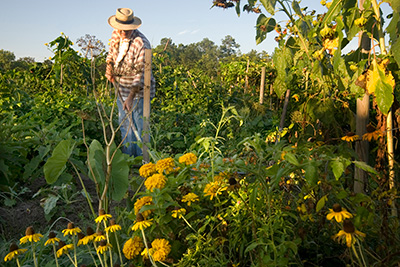
Organic gardening is more than simply replacing synthetic fertilizers and pesticides with natural alternatives. It is a comprehensive term that also describes gardening from an ecological perspective. This philosophy supports the health of not only the plants, but also soil microbes and beneficial insects so that the whole system is thriving.
While there are currently no options to certify your home garden as “organic,” there are general practices you can follow to make your garden more sustainable. Using organic gardening principles not only benefits the local environment and prevents pollutant runoff, it also limits the amount of harmful substances you encounter when working in the garden or consuming your vegetables.
“Organic” Products
When shopping for gardening supplies, pay attention to the label. The term “organic” sometimes refers to organic material, or material that is high in carbon (like manure or compost). If you are looking to use gardening supplies like pesticides and fertilizers that are approved for commercial organic production, look for the Environmental Protection Agency seal that states “for organic production” or the Organic Materials Review Institute (OMRI) seal.
Below are some organic gardening methods that will benefit your plants, the local environment and your body. If you choose to go this route, remember that even doing a few of these tasks will make a difference.
1. Improve and maintain healthy, fertile soil
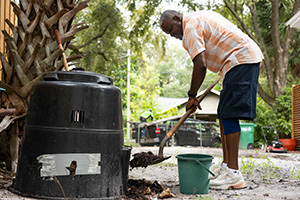
Increasing the soil’s organic matter improves soil structure and its ability to hold water, nutrients and air. Organic matter also suppresses nematode populations and creates food for plants when earthworms and microorganisms break it down. Compost can be used as an organic amendment to accomplish these tasks, and even help attain the desired pH of the soil (acidic soil is preferred by most plants.)
Instead of compost derived from leaf litter or food scraps, you can also apply organic composted animal manures. Raw manure is not recommended, as it has a strong odor, can damage plants and is a risk to human health due to pathogens. To help you choose safely, there is a label from the U.S. Composting Council Seal of Testing Assurance that you can find on store-bought compost that ensures the compost is pathogen-free.
2. Use seeds and transplants from organic sources when possible
Organically produced seeds are becoming more widely available online and in mail-order catalogues and garden centers. However, not all plant seeds are available yet as the organic seed industry is still getting established. It is more difficult to find organically produced transplants, but some may be purchased at farmers markets or certified organic producers.
3. Use quality soil mix when growing transplants from seed
Some commercially available soil mixes often have synthetic “wetting” agents and starter fertilizers that are not allowed in commercial organic agriculture . If you want to follow industry standards, try looking for mixes labeled as approved for use in organic production. You can also buy bulk ingredients and mix by hand. There are many different recipes, but one recommended by UF/IFAS is two parts compost, six parts peat moss or small pine bark chips, and two parts perlite or vermiculite.
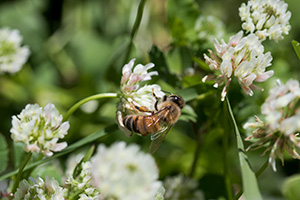
4. Use cover crops and green manure
Cover crops are planted for a short period of time and are not grown for harvest. Instead, they are used to maintain suitable conditions for your desired crop. Cover crops discourage weeds, reduce soil loss during heavy rains, provide habitat for beneficial insects, and provide pollen and nectar for pollinators. Some even reduce nematode populations or improve soil structure.
You can also plow the cover crops into the soil while fresh and green, which produces “green manure.” This can help with nutrient enrichment, pest and disease management, and weed suppression, among other things.
5. Use natural or organic fertilizers
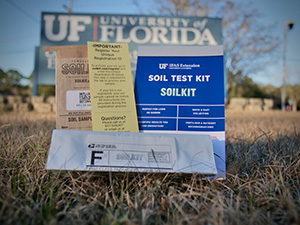
There are many natural and organic fertilizer products available in retail stores. Your nutrient plan could be a combination of store-bought fertilizers, compost and/or cover crops.
Before adding any nutrients or amendments to the soil, we recommend getting your soil tested by a licensed soil laboratory, such as UF/IFAS. The results will include fertilizer recommendations. More information about how to collect and submit a sample can be found by contacting your local UF/IFAS Extension office.
6. Use natural pest, disease and weed management
In organic gardening, management for disease, weeds and damaging insects mostly consists of cultural practices. Choosing vegetable varieties that are resistant to pests is one effective way to prevent issues. Avoid introducing diseased transplants into the garden by inspecting the leaves and roots before purchasing. You can sanitize gardening tools and supplies using chlorine or sodium hypochlorite (plain bleach) to prevent the spread of disease.
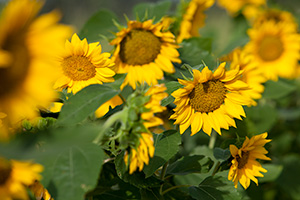
Changing the location of the crops between growing seasons (crop rotation) can hinder soil-borne diseases and nematodes. “Soil solarization” also reduces nematode populations as well as kills weeds. Mulches are excellent for weed and disease control and conserving soil moisture. Hand-pull weeds as soon as they appear and never allow them to flower and produce seeds. Trap cropping can lure damaging insects away from your harvest crops, and certain cover crops can attract beneficial insects that prey on the insect pests. Use drip irrigation or raised beds to prevent oversaturation in the soil that leads to root rot. The UF/IFAS Vegetable Gardening Guide has a list of “no-pesticide approaches” to vegetable gardening.
Products that can be used to combat disease include organic fungicides that contain baking soda, neem oil, sulfur or copper. Biological fungicides and insecticides are also available, which are beneficial bacteria, fungi or other organisms. Organic insecticides include insecticidal soaps, diatomaceous earth, kaolin clay and horticultural oils. To control weeds, gardeners can use horticulture products that contain citrus oils, oregano oil, acetic acid (vinegar) or corn gluten meal. For more information, refer to the UF/IFAS publication “Natural Products for Managing Landscape and Garden Pests in Florida.”
Keep in mind that pests should be identified before treatment to ensure you are using the correct method. Even organic products can be harmful to plants, beneficial insects, or humans if not used appropriately. Read and follow labels carefully. UF/IFAS recommends using products labelled for horticultural use rather than making your own mixtures with household products, because labelled products have been tested for effectiveness and safety.
You can create an organic vegetable garden by working with nature and taking preventative measures to avoid problems with crop health. While there are no certifications for organic home gardening, you can still have peace of mind that you are supporting both your health and the health of the local ecosystem.
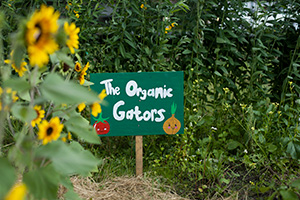
Also on Gardening Solutions
- Series: Vegetable Gardening in Florida
- Compost for the Home Gardener
- Cover Crops for the Edible Garden
- Mulch
- Organic Soil Amendments
- Soil pH
- Soil Solarization
- Soil Testing
- Trap Cropping
More from UF/IFAS
- The Florida Vegetable Gardening Guide–Ask IFAS
- Organic Vegetable Gardening in Florida–Ask IFAS
- The UF/IFAS Extension Soil Testing Laboratory
- IFAS Bookstore: Organic Methods for Vegetable Gardening, 1st Edition (as of date of publication, the 2nd edition is out of stock)
